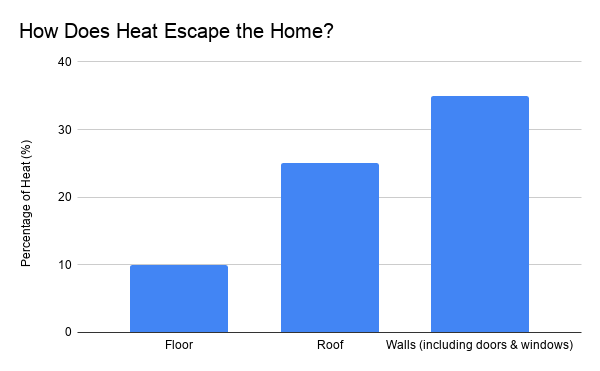How to Make a Cold House Warm

As energy tariffs continue to rise, finding ways to keep a cold house warm, could save you money on your bills while also keeping you warm through the winter.
A well-insulated property will help to keep more heat in the home but if it still feels cold then it might not be the case that heat is escaping your property. In that case, it's worth turning your attention to the heating system itself as it might need to be serviced or replaced.
Why does heat escape the home?
Before looking at how to keep a cold house warm, it's worth trying to find where you might be losing heat.
Central heating systems work to keep a house warm but gaps and cracks around the home allow the heat to escape as well as letting in cold draughts. This means that the boiler will only have to work harder to keep a cold house warm which will see your energy bills rise.
The majority of heat within the home escapes through the walls, doors and windows (35%) with a further 25% going out through the roof. The floor is also guilty of causing heat loss, with 10% sinking through the floor. This is known as the thermal envelope and it's possible to slow down the rate at which heat escapes the property with sufficient insulation.

As well as sufficient wall, loft and floor insulation, it's important to make sure that you have a central heating system that can effectively and efficiently heat the entire property.
12 tips to keep a cold house warm
From small changes you can make to warm up a room without a heater, to why it might be time for a new boiler, these 12 tips on how to keep a cold house warm will help you through the winter.
1. Insulation
Insulation is one of the best ways to prevent heat loss. After all, vast amounts of heat are lost through the walls, roof and floor.
- Loft insulation: Heat rises so a thick layer of insulation in the loft will help to prevent it from escaping out through the roof.
- Cavity wall insulation: Older properties have a cavity between the inner and outer walls. Filling this space with cavity wall insulation will help to retain much of that 35% of heat that would otherwise be lost through the walls.
- Floor insulation: Hardwood floors can have cracks so in addition to filling them with a sealant, insulation underneath can be effective.
In addition to these 3 forms of insulation, if the windows around a property a single-glazed, then double or even trips glazing can also act as an effective insulator.
While fitting double glazing around the home is effective, it can prove costly. Fortunately, there's a much cheaper alternative: thermal window film. Sticking thermal window film to your windows will help prevent more heat from escaping by reflecting it back into the room.
2. Draught-proof your home
Filling or covering the gaps and cracks where heat could escape will not only keep your home warm but keep your energy bills down too. These gaps are mostly found around windows and doors, simply applying some insulating tape can prevent a draught from making its way into the home.
You'll also need to think about the letterbox, keyholes and pet flaps too as they all let draughts into the property. Brushes can be added to letterboxes and pet flaps, while a cover can be added to keyholes.
Take the draught-proofing even further by covering up the gap at the bottom of internal doors where the warmth of one room can escape into another. Covering that space with a draught excluder will prevent heat from escaping.
3. Pipe lagging
Pipes transport the hot water around the central heating system so keeping it hotter for longer will make your home's central heating much more efficient. Wrapping lagging around the pipes will act as an insulator, keeping the pipes warmer for longer, and you don't even need any tools to do it.
4. Bleed the radiators
If you've found that one or more of the radiators around your home aren't heating up as well as they used to, then they might need bleeding.
Bleeding a radiator is the process of releasing air from the central heating system. Excess air in the radiators can act as a blockage, preventing the hot water from circulating. You'll be able to tell if a radiator needs bleeding as the top will be a lot cooler than the bottom.
If you feel confident our Guide to Bleeding a Radiator can take you through the steps, otherwise, don't hesitate to contact a heating engineer.
5. Arrange a boiler service
The vast majority of UK homes have a gas boiler for central heating, so making sure it's in top condition is highly important when it comes to keeping a cold house warm.
Arranging an annual boiler service involves a Gas Safe registered engineer (OFTEC engineers for oil boilers) checking the unit over to ensure that it's running safely and efficiently.
Not only is having a gas boiler serviced each year a legal requirement, but they're also highly important in terms of safety and the efficient running of the heating system.
A service can:
- Ensure the safe running of the system;
- Help to keep your heating bills down;
- Keep the warranty valid; and
- Bring a potential issue to the attention of a heating engineer before it worsens.
Take a few moments to complete our simple online form and you'll get a free quote from a fully-qualified Gas Safe registered engineer based in your local area.
Get a FREE Boiler Service Quote
6. Get a smart thermostat
A smart thermostat will give you complete control over your central heating and also be able to learn about the energy usage habits of your home.
Smart thermostats can adapt to how and when the heating is used in your home, turning the central heating on and off at the most efficient times. This will help to keep your home at a comfortable temperature as well as help to reduce your energy bills.
Find out which are the Best Smart Thermostats.
7. Hang curtains and close them at night
As we've mentioned, a lot of heat can be lost through a room's windows and curtains play an important role in keeping the heat in and the cold out. The thicker they are the better.
It might sound simple but as well as keeping the curtains closed at night, opening them up during the day will let the sunlight in – a natural and effective way of keeping your home warm.
8. Foil-covered card behind the radiators
Heat escapes radiators from the front and back which means a lot of the heat is being used to heat the wall behind the radiator – not much help when it comes to heating your home.
One trick to stop the heat from heating the wall is by wrapping a sheet of card in tin foil and sliding it behind the radiator. Doing this will reflect the heat, that would have otherwise been wasted, back into the room.
9. Have thermostatic radiator valves fitted to the radiators
Adding thermostatic radiator valves (TRVs) to the radiators around your home will give you more control over which rooms you want heating up and how hot you want them to be. Once the desired temperature has been reached, the TRV will switch the radiator off to save energy. Contain the heat within the room by keeping the door closed.
10. Clear the space in front of radiators
Having large pieces of furniture in front of radiators will prevent the heat from spreading around the room. Instead, it will all be absorbed by the furniture and you won't feel the benefit.
As well as clearing the space in front of a radiator, it can also be beneficial to fit a shelf above the radiator too. The shelf will act as a block to stop the heat from rising and channel it into the room. This is most beneficial in homes with high ceilings and radiators installed underneath windows.
11. Place rugs on hardwood floors
Hardwood floors often have tiny gaps between the panels which can allow heat to escape. Covering a hardwood floor with a rug will help to keep more heat in the room.
12. Replace your central heating system
Doing all of the above will only go so far if your existing central heating system is old and inefficient. A boiler that's more than 8 years old might need to be replaced with a new modern boiler to get your home up to a comfortable temperature.
While the total cost of a boiler replacement could come to around £2,000, there are savings of up to £580* on energy bills to be made and the increased comfort will be priceless.
Do I need a new boiler?
You can make sure your house is well insulated and draught-proof but if the central heating system isn't up to scratch then your house still won't be able to reach a comfortable temperature during the winter.
The clearest sign you need a new boiler is if it breaks down beyond repair but you won't want to wait until that point. Here are several signs that tell you it's time to replace your boiler:
- Boiler was installed more than 10 years ago
- The unit doesn't have an ErP A-rating
- Energy bills have been on the rise
- You're often having to call out a heating engineer for repairs
- Central heating simply isn't as effective as it used to be
Benefits of a new boiler
A new boiler could be the secret to keeping a cold home warm, especially if it was installed more than 10 years ago. There are many more benefits that come with installing a new boiler too:
- A more comfortable temperature for your home
- Higher level of efficiency
- Reduced energy bills
- Lower carbon footprint
- Covered by a warranty period in the event of a fault
According to the Energy Saving Trust, a new boiler has the potential to reduce your energy bills by as much as £580 a year* which could soon see you get a return on the initial boiler replacement costs.
Boiler replacement costs
A boiler replacement has the potential to be a big investment but the potential savings that are there to be made, when replacing an older inefficient boiler, could soon see you making a return on that investment.
A straightforward boiler replacement can end up costing around £1,800 – £2,500. The price will begin to rise beyond this in cases where the installation becomes more complicated, such as it being moved to a different location.
For a comprehensive look at how much a boiler replacement might cost you, take a look through our guide: New Boiler Cost UK.
Prices charged by installers for the installation can vary from £500 – £1,000 so when it comes to finding the most competitive price on the installation of a replacement boiler, we highly recommend comparing multiple quotes.
To make finding multiple quotes easier, you can get free quotes from up to 3 heating engineers based in your local area using Boiler Guide. Simply take a few moments to complete our online form and we'll match the work you need doing with boiler installers.
Reference
Energy Saving Trust, Heating Your Home: Boilers (2022) *Based on replacing an old gas boiler with a condensing A-rated boiler with thermostatic radiator valves, programmer and room thermostat in a detached home. Figures are based on fuel prices as of April 2022.



